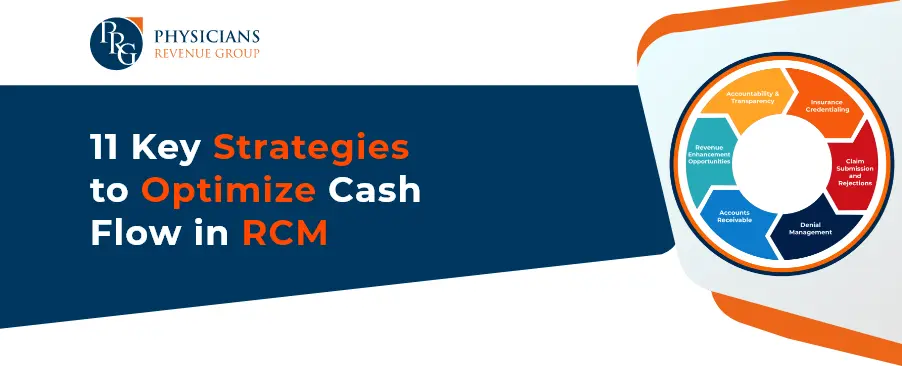
Email: info@prgmd.com | Call: +1 (630) 242-6474
Business hours: 9:00 to 5:00 | Monday to Friday
Email: info@prgmd.com | Call: +1 (630) 242-6474
Business hours: 9:00 to 5:00 | Monday to Friday

Table of Contents
ToggleImproving your healthcare practice’s revenue cycle management is easier than you may think. Various reasons, including insurance verification and denial management, impact your practice’s revenue. So, if your billing team or department struggles to keep up – it might be a good time for change. To boost your cash flow in RCM, you must first analyze the inner workings details of your billing department – this shall help you determine where changes might need to be made.
Or
Leave your billing headaches and the limitations of conducting a successful healthcare financial analysis by outsourcing to a third-party billing company. Before taking that leap, you must know and understand the following:
Cash flow in RCM for healthcare institutions highly depends on streamlining billing operations. RCM deals with a healthcare institute’s business and clinical sides by collectively working the patient’s care data with the administrative data, which includes:
Communicating with insurance providers is essential for sufficient cash flow in RCM. Furthermore, below are some of the main functions of an effective revenue cycle management, including:
A healthier cash flow in RCM helps deliver better patient care by making the necessary funds available for acquiring medical equipment and improving the healthcare infrastructure. Maximizing cash flow in RCM should be a priority of practice owners; this can be done by understanding and implementing effective strategies.
Below, we have compiled the top 11 effective strategies for revenue cycle that can help you increase your practice’s cash flow.
Integration between your practice management and billing software is vital for simplifying cash flow in RCM. It facilitates the automatic checking of patient eligibility for services. It also ensures that patients are covered for the upcoming services, allowing providers to inform them about their options transparently if coverage is lacking. Streamlining this process optimizes cash flow in healthcare revenue cycle management.
Furthermore, a study by the Healthcare Financial Management Association (HFMA) revealed that practices implementing automatic eligibility checking reported a 20% decrease in billing errors.
A substantial problem towards an effective cash flow in RCM is a heavy volume of accounts receivable – the pending payments from patients or insurance companies for healthcare services. Minimizing accounts receivable is essential for a healthier cash flow in healthcare practices.
A well-managed A/R relies on a dependable and efficient payment system, ensuring timely payments from patients and payers. Introducing an EHR system serves as a bridge between payers and the healthcare practice, computerizing payment processes.
Enhancing revenue in healthcare relies on effective RCM. A vital approach is structuring the unique workflows. Here’s where automation can significantly impact the cash flow in RCM:
Many claim denials arise from errors in the initial RCM stages, like missing patient information or inaccurate coding. Embracing automation lowers claim denials and makes the entire revenue cycle more cost-effective, ultimately boosting profitability.
Recent industry statistics indicate that practices adopting comprehensive workflow automation experience a 30% decrease in claim denial rates. This highlights the impact of automation on the efficiency of revenue cycle management.
Chronic care management is beneficial for providers to increase income while helping patients. A well-structured CCM program introduces a fresh source of cash flow in RCM without burdening your team.
Additionally, a chronic care management system enhances financial returns and develops a practical approach to patient well-being. This dual impact is valuable in the healthcare landscape.
Outsourcing RCM services can increase the quality of claims management, and significantly impact the cash flow in RCM. By joining forces with an RCM partner, your practice can achieve clean claims rates as high as 99%. Expert billers use claims scrubbing and tracking to optimize every claim for payment.
Incorporating these advanced claims management techniques minimizes errors and accelerates the reimbursement process. This, in turn, contributes to a more healthy practice cash flow.
Statistics indicate that practices outsourcing claims management witness a remarkable 25% reduction in claim denial rates, emphasizing the effectiveness of this approach.
A well-functioning denial management system is essential for maintaining an optimal cash flow in RCM. Billing services partners play a vital role in this aspect. They track claims through payment and address and rectify denials, ensuring a seamless resubmission process for payment.
This practical denial management approach reduces revenue loss. Practices partnering with RCM services report a 30% decrease in the overall impact of claim denials on practice revenue.
Increase patient collections by providing a variety of payment options. Allowing patients to pay through credit card, check, or bank draft and reminding them via the patient portal for overdue bills ensures convenience for patients and maximizes collections.
Implementing multiple payment options and using patient portals for notifications and follow-ups results in a 20% increase in on-time payments. This straightforward strategy contributes directly to improving the overall cash flow of healthcare practices.
Share:
Categories
Recently Added

What is an ABN in medical billing?

What does a Clearinghouse do During Claims Submission?

What is EOR in Medical Billing?
We Would Love to Assist You!
We treat your data confidentially and don’t share any information with a third party.